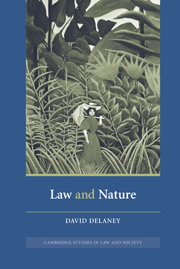15 - Beyond “nature”: the material life of the legal
Published online by Cambridge University Press: 22 July 2009
Summary
With our examination of Walter Harper's struggles with the authorities over the invasion of his body and occupation of his mind we seem to have come a long way from the landslides in Malibu and mineral exploration in northern Minnesota with which this survey began. In a sense we have. The troubles surrounding mental illness and psychopharmacology and their relationship to constitutionally protected interests in bodily integrity, at first impression, have little to do with slope failure, civil engineering, and standards of negligence. On the other hand, these and the intervening sites in our trajectory are versions of each other – at least when viewed through the commonplace abstractions of nature talk. In each of these trouble cases we have seen the repetition of a stock set of organizing tropes and images and the deployment (and counterdeployment) of familiar distinctions. In each we have seen variations on a small set of themes in the practice of making sense of power and experience with “nature,” its surrogates and conventional oppositions. In many of the contexts, similar fears and aspirations animate the engagements. In most, the renderings of nature and humanness are connected to physical interventions and to transformations in the material world. In the arguments about passions and scientific reasoning, infertility and extinction, violence and treatment, we encounter iterations of the same social, cultural, and political practices of line drawing.
- Type
- Chapter
- Information
- Law and Nature , pp. 397 - 406Publisher: Cambridge University PressPrint publication year: 2003



